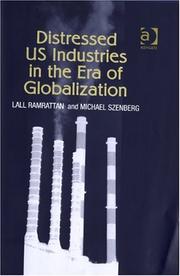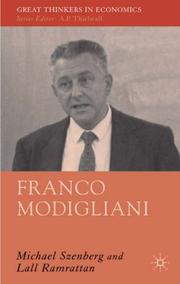Digital
ISBN: 9783030055578 Year: 2019 Publisher: Cham Springer International Publishing :Imprint: Palgrave Macmillan
Abstract | Keywords | Export | Availability | Bookmark
 Loading...
Loading...Choose an application
- Reference Manager
- EndNote
- RefWorks (Direct export to RefWorks)
The publication of Alexis de Tocqueville’s Democracy in America has kindled interest across disciplines to appraise the exceptional nature of U.S. activities. In general, however, all the published works have not focused their analyses from an economic point of view. While economics was for some a “dismal science” following Thomas Carlyle’s characterization of Malthus’ demographic model, it has increasingly become the “queen of the social sciences” for more practitioners. The book fills a gap in the literature by describing the American contributors as precursors and genuinely exceptional economists. We present their works within the state of the nation in which they advance their discipline. One is treated to both qualitative and quantitative theories in the opening chapter. Budding theories that became established theories of Economics and Finance are investigated in Chapters II and III. When President John Adams was confronted with M. Turgot’s criticisms of the American government, he resorted to a historic survey of types of government from ancient Greece to the Middle Ages. Similarly, we have included a final chapter, Chapter IV, to present the argument for American Exceptionalism in the domain of Political Economy and Economic Law over the ages.
Politics --- Methodology of economics --- Economic schools --- Finance --- Economic policy and planning (general) --- Economics --- World history --- History --- financieel management --- economie --- economische politiek --- geschiedenis --- politiek --- economische geschiedenis --- sociale interventies --- North America
Multi
ISBN: 9783031170652 9783031170645 9783031170669 9783031170676 3031170652 Year: 2022 Publisher: Cham : Springer International Publishing : Imprint: Palgrave Macmillan,
Abstract | Keywords | Export | Availability | Bookmark
 Loading...
Loading...Choose an application
- Reference Manager
- EndNote
- RefWorks (Direct export to RefWorks)
This book is a compilation of economic views on the purpose of life. It follows a unique approach, starting with propositions from diverse fields that act as governing laws of the purpose of life in economics, then guiding the reader through the physical, philosophical, and psychological views of the purpose of life, as economics and economic theories can find their roots in all these areas. The book concludes with the purpose of life presented through economic doctrines (from the pre-classical, to classical, to neo-classical schools of economic thought), through the lens of economic development, and from the perspective of several religious doctrines. Lall Ramrattan is an Instructor at the University of California, Berkeley, USA. He has served as an associate editor of The American Economist, and holds a Ph.D. from the New School for Social Research, USA. Michael Szenberg is Distinguished Professor of Economics at Touro University, USA. He is Distinguished Professor Emeritus of the Lubin School of Business at Pace University, USA. He is recipient of many awards, including the 2013 John R. Commons Award, and he served as the editor, Emeritus, of The American Economist (1973-2011).
Philosophy --- Economic sociology --- Methodology of economics --- Economic schools --- Economic structure --- Economics --- History --- economie --- filosofie --- geschiedenis --- Political philosophy. Social philosophy --- Philosophical anthropology --- General ethics --- Philosophy. --- Economics. --- Philosophy of Economics. --- Economic Sociology. --- History of Economic Thought and Methodology. --- Sociological aspects. --- History.

ISBN: 9780754670520 Year: 2007 Publisher: Aldershot Ashgate
Abstract | Keywords | Export | Availability | Bookmark
 Loading...
Loading...Choose an application
- Reference Manager
- EndNote
- RefWorks (Direct export to RefWorks)
Globalization --- Industries --- Economic aspects --- United States --- Economic conditions
Book
ISBN: 3319528009 3319527991 Year: 2017 Publisher: Cham : Springer International Publishing : Imprint: Palgrave Macmillan,
Abstract | Keywords | Export | Availability | Bookmark
 Loading...
Loading...Choose an application
- Reference Manager
- EndNote
- RefWorks (Direct export to RefWorks)
This collection gathers some of the greatest minds in economics to discuss their experiences of collaborative research and publication. Nobel Prize winners and other eminent scholars from a representative sample of economics' major sub-disciplines share how and why they came to work primarily in partnerships or on their own, whether naturally or by necessity. The contributions include discussions of personal experiences, statistical analyses, different levels of investment, and how the digital age has changed researcher interactions. As budget cuts and resource consolidation make working together vital in ever more fields of academia, this book offers valuable advice to help young and seasoned scholars alike identify the right co-author(s).
Education --- Sociology --- Economics. --- History of Economic Thought/Methodology. --- Education Economics. --- Research Methodology. --- Research Methods in Education. --- Economic aspects. --- Research. --- Economics --- Economic history. --- Education-Economic aspects. --- Sociology-Research. --- Education—Research. --- Economic conditions --- History, Economic --- Education—Economic aspects. --- Sociology—Research.
Multi
ISBN: 9783319528007 3319528009 Year: 2017 Publisher: Cham : Springer International Publishing : Imprint: Palgrave Macmillan,
Abstract | Keywords | Export | Availability | Bookmark
 Loading...
Loading...Choose an application
- Reference Manager
- EndNote
- RefWorks (Direct export to RefWorks)
This collection gathers some of the greatest minds in economics to discuss their experiences of collaborative research and publication. Nobel Prize winners and other eminent scholars from a representative sample of economics' major sub-disciplines share how and why they came to work primarily in partnerships or on their own, whether naturally or by necessity. The contributions include discussions of personal experiences, statistical analyses, different levels of investment, and how the digital age has changed researcher interactions. As budget cuts and resource consolidation make working together vital in ever more fields of academia, this book offers valuable advice to help young and seasoned scholars alike identify the right co-author(s).
Science --- Sociology --- Methodology of economics --- Economic schools --- Development aid. Development cooperation --- Economics --- Research on teaching --- Teaching --- World history --- History --- sociologie --- didactiek --- economie --- geschiedenis --- onderwijs --- onderzoeksmethoden --- opvoeding --- economische geschiedenis --- onderwijsonderzoek --- Education --- History of Economic Thought and Methodology. --- Education Economics. --- Sociological Methods. --- Research Methods in Education. --- History. --- Economic aspects. --- Methodology. --- Research.

ISBN: 9780230007895 0230007899 1349283509 9786611914479 1281914479 0230582435 9781281914477 9780230582439 Year: 2008 Publisher: New York: Palgrave MacMillan,
Abstract | Keywords | Export | Availability | Bookmark
 Loading...
Loading...Choose an application
- Reference Manager
- EndNote
- RefWorks (Direct export to RefWorks)
Starting with an overview of Modigliani's life, the authors explain and assess his influential theories, including his theory of the life-cycle hypothesis of saving; the famous Modigliani-Miller theorem in corporate finance; stabilisation policy; econometric model building and forecasting, and his legacy and influence on contemporary economics.
Economic schools --- Modigliani, Franco --- Economists --- -Keynesian economics --- 330.156092 --- Post-Keynesian economics --- Schools of economics --- Social scientists --- Modigliani, Franco. --- Modigliani, F. --- Keynesian economics --- Keynesian economics. --- Economic theory. --- Macroeconomics. --- Economic history. --- Economics. --- Macroeconomics/Monetary Economics//Financial Economics. --- Economic History. --- Economic Theory/Quantitative Economics/Mathematical Methods. --- Economic conditions --- History, Economic --- Economics --- Economic theory --- Political economy --- Social sciences --- Economic man --- Economists - Italy --- Econometrics. --- Macroeconomics and Monetary Economics. --- Quantitative Economics.
Book
ISBN: 9780262525466 0262525461 Year: 2014 Publisher: Cambridge (Mass.): MIT Press,
Abstract | Keywords | Export | Availability | Bookmark
 Loading...
Loading...Choose an application
- Reference Manager
- EndNote
- RefWorks (Direct export to RefWorks)
Editors of academic journals are often the top scholars in their fields. They are charged with managing the flow of hundreds of manuscripts each year - from submission to review to rejection or acceptance - all while continuing their own scholarly pursuits. Tenure decisions often turn on who has published what in which journals, but editors can accept only a fraction of the papers submitted. In this book, past and present editors of economics journals discuss navigating the world of academic journals. Their contributions offer essential reading for anyone who has never submitted a paper, served as a referee or associate editor, edited a journal - or read an article and wondered why it was published. The editors describe their experiences at journals that range from the American Economic Review to the Journal of Sports Economics. The issues they examine include late referee reports, slow resubmission of manuscripts, and plagiarism - as well as the difficulties of "herding cats" and the benefits of husband-wife editorial partnerships. They consider the role of the editor, as gatekeeper or developer of content ; and they advise authors to write more carefully and clearly, to include citations that locate their articles in the context of the existing literature, and to update their work after it has been submitted and rejected elsewhere. The chapters also offer a timely, insider's perspective on the general effectiveness of the system of academic journals in economics.
Science --- Economics --- Editing --- Editors --- Economics - Periodicals
Book
ISBN: 1618114670 1618114662 9781618114679 9781618114662 Year: 2015 Publisher: New York, New York : Touro College Press,
Abstract | Keywords | Export | Availability | Bookmark
 Loading...
Loading...Choose an application
- Reference Manager
- EndNote
- RefWorks (Direct export to RefWorks)
This book looks into the creative minds of some recent, mostly "defunct" economists. Many of the authors, such as Samuelson, Friedman, Galbraith, and Heilbroner, have penned popular works, while their scientific contributions were limited to the most specialized scholars. Others, such as Nobel Prize winners Modigliani, Debreu, Becker, Aumann, and Allais, delved into complex issues in human organization, economic growth and planning, socio-economic theory, and model building. Economists such as Keynes and Lowe represent world-class paragons whose influences continue to percolate in current research programs. Here we unearth their best scientific work, revealing gems that might otherwise be overlooked.
Economists --- Economics --- History. --- History --- E-books
Book
ISBN: 1283217724 9786613217721 1845423631 Year: 2004 Publisher: Cheltenham, U.K. ; Northampton, Mass. : Edward Elgar,
Abstract | Keywords | Export | Availability | Bookmark
 Loading...
Loading...Choose an application
- Reference Manager
- EndNote
- RefWorks (Direct export to RefWorks)
In this collection of autobiographical essays, 26 prominent scholars detail their professional development, while offering insight into their lives and philosophies. With candor and humor they tell how they came to the field of economics, as well as how their views have evolved over the years.
Economists --- Economics --- Philosophy.
Multi
ISBN: 9781618114679 9781618114662 1618114670 1618114662 Year: 2015 Publisher: New York, NY
Abstract | Keywords | Export | Availability | Bookmark
 Loading...
Loading...Choose an application
- Reference Manager
- EndNote
- RefWorks (Direct export to RefWorks)

 Search
Search Feedback
Feedback About UniCat
About UniCat  Help
Help News
News